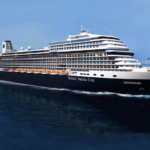Every year it is estimated that about 25 million people go aboard a cruise. These cruise ships are like floating cities and can be on the water for weeks at a time. Deaths do happen, of course, while on board. What happens when a cruise ship passenger dies at sea?
When a cruise ship passenger dies at sea, the “Operation Rising Star” signal is given off by the cruise. The death is handled discreetly by the cruise ship to keep the passengers at peace. The onboard medical doctor confirms the death. The body is then put in a body bag and placed in the cruise ship’s morgue.
Yes, there are morgues on the ship because it is not uncommon to have deaths. This is especially true as the majority of the passengers are the elderly. Cruises are required to have body bags and a morgue where the body of a dead person can be placed.
Read on to learn more about what happens when a cruise passenger dies at sea, including what the cruise ship doesn’t want you to know.
What Happens When a Cruise Ship Passenger Dies at Sea?
There is only a set limit of time that the dead body in the morgue can stay. If the cruise ship happens to be far off the home port, then the body is offloaded early in the morning in the next major port city where it will dock.
The offloading happens early in the morning so that the passengers do not see it. Then the arrangements for the repatriation of the body are coordinated with that country. If the cruise ship is already near its homeport, then the body is offloaded there.
Most deaths at sea are caused by natural causes, with heart attack found to be among the leading cause of natural deaths. However, if there was suspicion of crime involved in the death of a passenger, the place where they died is cordoned off so that evidence can be kept intact.
If the cruise ship is an American company, the FBI is alerted of the crime, and they get on board at the next port that the cruise ship docks in to conduct their investigation.
Many cruise ships do not openly discuss deaths onboard. After all, the image that people associate with going on a cruise is one of eating, drinking, merriment, and travel. And this is indeed what happens most of the time.
Causes of Deaths at Sea
The main cause of death at sea is a natural one brought about by a health condition. It has even been found out that a majority of those who died from natural causes died from having a heart attack.
It is not uncommon to find out about people dying on a cruise ship, even if this is not openly discussed by cruise ships. After all, a big percentage of the people who go aboard on some luxury cruises are those that are in their 50s and above. The reason is that they are the ones who have the time and the money to afford to go on one.
Some cruises run for a few months at a time, and many elderly people go on these longer cruises because they find it cheaper than the living expenses that they have to shoulder when they are in their home country. So the death of an elderly person is a regular occurrence on such types of cruise ships.
There are a few who die on a cruise ship by falling off one of the rails. Those who do so are often tipsy from all the heavy drinking that they did on the cruise. After all, you are encouraged to have fun while you are on one, and drinking alcohol is one of the ways that you can do so.
However, a small percentage of accidental deaths from falling involve young children, and it is always heartbreaking to learn news about this. Another cause of accidental death among the young includes drowning in the ship’s pool. That is why it really is a must for parents always to have their eyes on their young kids to prevent this from happening.
While there are few cases of it reported, murder is one of the causes of death of a passenger on board a cruise ship. When a crime happens at sea solving it is actually trickier because there are many factors involved such as the nationality of the dead person and the part of the world where it happened.
Other causes of death appear bizarre. Examples of these include a gospel singer dropping dead while performing on stage and a person who accidentally died after trying to climb the ship’s mast. [1]
What Happens to the Body of the Passenger Upon Death?

A funny rumor goes around saying that when you are on a cruise, and the crew suddenly serves ice cream to the passengers, it means that they need to empty the freezer to store a dead passenger.
But of course, this rumor is unfounded as cruise liners are required by law to have preparations in place in case of the death of a passenger. That is why if you ask a crew member, they will tell you, likey in a quiet voice, that they have a morgue and body bags ready in case that happens.
When a cruise ship passenger dies, the medical doctor of the cruise ship examines the body immediately to confirm the death. After that, the body is immediately placed inside a body bag and carried to the ship’s morgue.
A cruise ship’s morgue can typically hold about three to five dead people at a time. The body can only stay there for a few days due to health and safety reasons. And every port city requires that dead passengers onboard be declared.
When the cruise ship docks in the next port, the body is offloaded there, and it stays in a morgue in that town. This is what cruise liners do, especially for those that go on for months. They cannot keep the body for long under the ship as passengers will get uneasy if they find out that they are traveling with a dead person there.
However, if the cruise ship is already a few days from the home port, then the dead person is offloaded there and whisked away to a morgue that can hold it until the deceased’s family brings it home. If the deceased does not have any family, then the authorities in that town will be the ones to decide on what to do with the dead person’s body.
How the Cruise Ship Helps the Bereaved Family
Part of the preparations that cruise ships have for such an event is having a guest care team member assigned to help the bereaved family of a person who dies on board. This member received training in giving logistical and emotional support to the family that the dead person left behind.
However, their training does not include grief counseling. They are there mainly to provide support to the family. Some of the tasks involved would be contacting a funeral home in the port city where the cruise ship will dock next and preparing things needed for the body’s repatriation.
For such arrangements to be made while onboard, they need to use communication tools. They also allow the bereaved family to use their phone and internet without cost.
If the bereaved family chooses not to continue with their cruise anymore and get off in the next port, the care team member will drive them to the hotel where they will be staying and continue to help them in making arrangements there for their deceased loved one. There are even some who stay with the family until they get back home. Not only that, but this member also does a post-cruise follow-up with the family to make sure that they are alright.
Aside from a member of the guest care team, some cruises have Catholic ministers on board that can give emotional support to the grieving family there. Such ministry is spearheaded by the Catholic group named Apostleship of the Sea. For some Catholics, it can be a consoling thing to get to talk to a priest after the loss of a loved one on board.
Bringing the Body Back Home
The biggest challenge that faces the family left behind is bringing the dead body back home. This is not such a big problem if the dead happens to be a citizen of the cruise ship’s home port and the cruise ship offloads the body there. The family or the insurance company will just have to pay for the domestic travel of the dead body so that it can be brought back home.
The bigger problem lies when the dead body is offloaded in a different country. The expenses involved in having a body repatriated from another country are huge. And the cruise ship is not liable for covering such expenses. If the person has travel insurance covering repatriation, the insurance company will cover these expenses. If not, then the family of the deceased will carry the burden of coming up with funds involved in this process.
There is an alternative if the dead person’s family does not have the funds to make the repatriation happen, and that is to have their dead buried in the port city where they docked. This will be much cheaper compared to bringing their dead loved one back home.
They just need to make arrangements with the local authorities in that town to make this happen. The only disadvantage of this is that they won’t be able to visit the grave of their dead as often as they would like.
If they really want to take their dead loved one home but do not have enough money, then what they can opt for instead is the cremation of the body in the port city. After that, the remains can be placed in an urn that they can bring back home. They can even choose to finish the cruise along with the urn that holds the ashes of their loved one. This is like a symbolic way of letting your deceased love one finish the cruise with you.
The fee for boarding a dead person on a plane to be brought home is astronomical. In order to prevent families from suffering such a financial setback brought on by an untimely death, it is always highly recommended for passengers to get a comprehensive travel insurance plan before getting on the cruise.
This insurance plan ensures that even if a cruise ship passenger dies on board, the deceased can still be laid to rest in their home country while not causing a financial setback to those that they leave behind.
Related reading:






